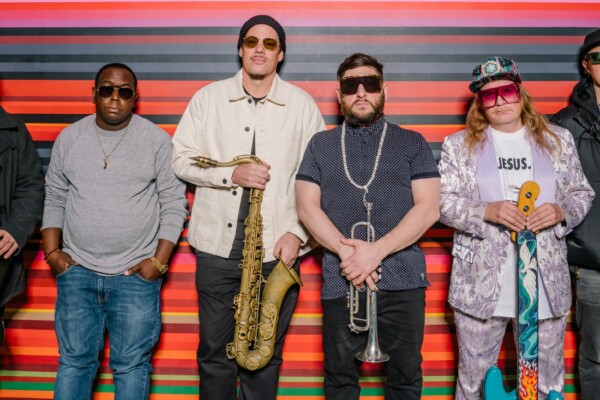Resonate: An Interview with Erick “Jesus” Coomes
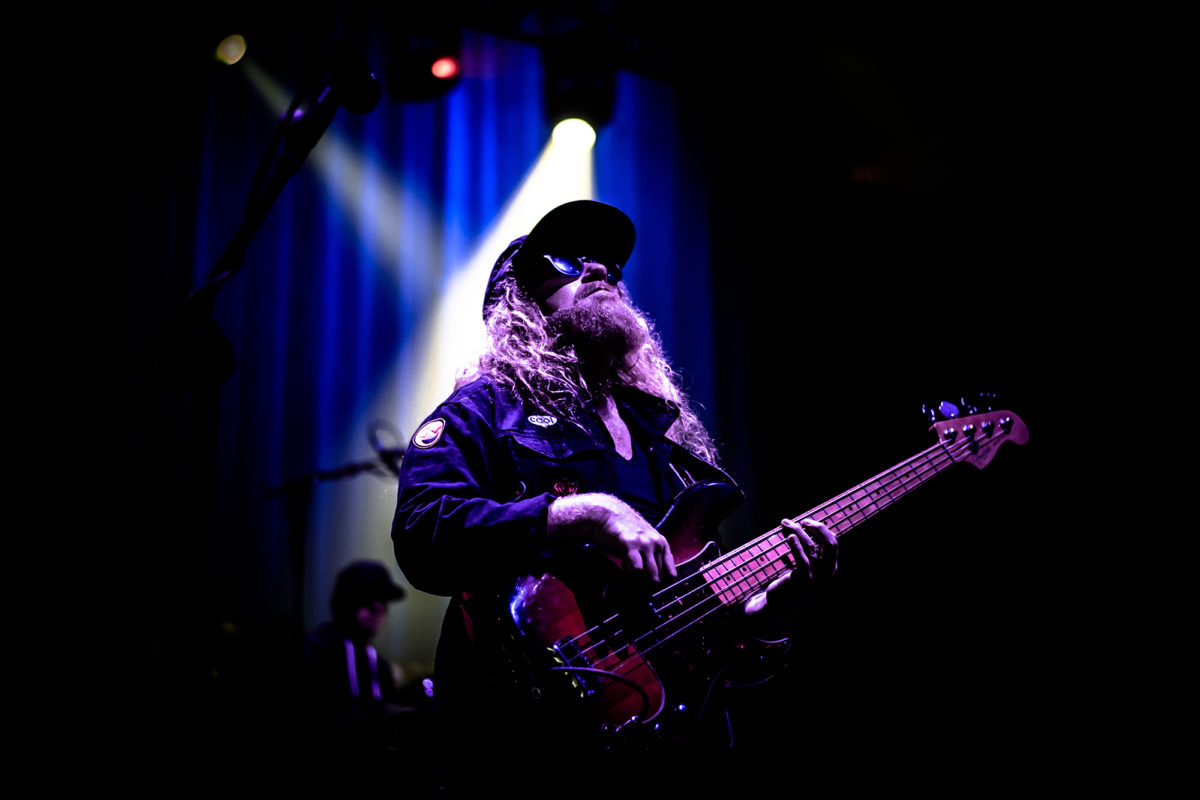
Hot on the heels of last year’s Elevate, Lettuce is dropping its companion album, Resonate, on May 8th. The albums were recorded during the same fruitful string of studio sessions, though they each have their own personality. They’re both tied together by the undeniable bass grooves by Erick “Jesus” Coomes.
Born and raised in Southern California, the bassist has been in the entertainment business for most of his life. He comes from a musical family and was also a child actor. He picked up the bass at 15 and soon began private lessons with jazz master John Patitucci. Coomes got a foothold in the Christian music scene and would go on to attend Berklee College of Music, where he met his future Lettuce bandmates.
Aside from his work in the popular funk band, Coomes and his brother Tycoon became top call artists in the Los Angeles hip-hop scene. His resume reads like a who’s who of the genre with credits alongside Dr. Dre, Kanye West, Eminem, Ne-Yo, DJ Quik, Talib Kweli, Anthony Hamilton, and more. He also worked as a touring bassist for Britney Spears an The Game.
When we caught up with Coomes, it was a couple of weeks into the COVID-19 pandemic. He gave us the scoop on dealing with the quarantine, the new album, and what it was like working with Dr. Dre.
How are things going for you with all of this?
We’re thriving. We’re talking to each other on the phone every day since we’re pretty spread out. All through the night last night, we were all sending around music. Someone would send something without the bass part and say, “You lay down the bass part.” Then we’d call each other after and talk about it. We were just geeking out and making tons and tons of music. We’re blessed to have the internet and to have the technology right now that’s helping us communicate.
We’ve also been doing lessons and video chats on Zoom. It’s been a blessing in a way for us and young players out there that are wanting to learn. It’s been a blessing for me, personally, just getting online with a couple of people to teach bass. When you teach something, you learn it more, so I’ve been learning a lot.
What are bass lessons with you like? What do you focus on?
Fundamentals, mainly. I also ask the student to tell me what they want to learn in case they have any specifics. Some people want to learn how to vibe out or how to funk or do the basics or produce a record. Some people want to learn a particular Lettuce song or a part of a song they’ve been trying to figure out.
I’m generally trying to impart wisdom and things I’ve learned. Especially fundamentals of bass, because the bass is such a function. In every kind of music, there’s a bass part that is designed to go in the song. Typically, music sounds fuller and broader if there’s a beautiful bass part. It’s like playing your role in society, life, and in nature. Everything plays its part. I teach people to play their part because, from my perspective, music is a way of communicating with each other in rhythm. It’s really fun when the magic starts to happen with those different parts because each person playing their part makes the connection heavy.
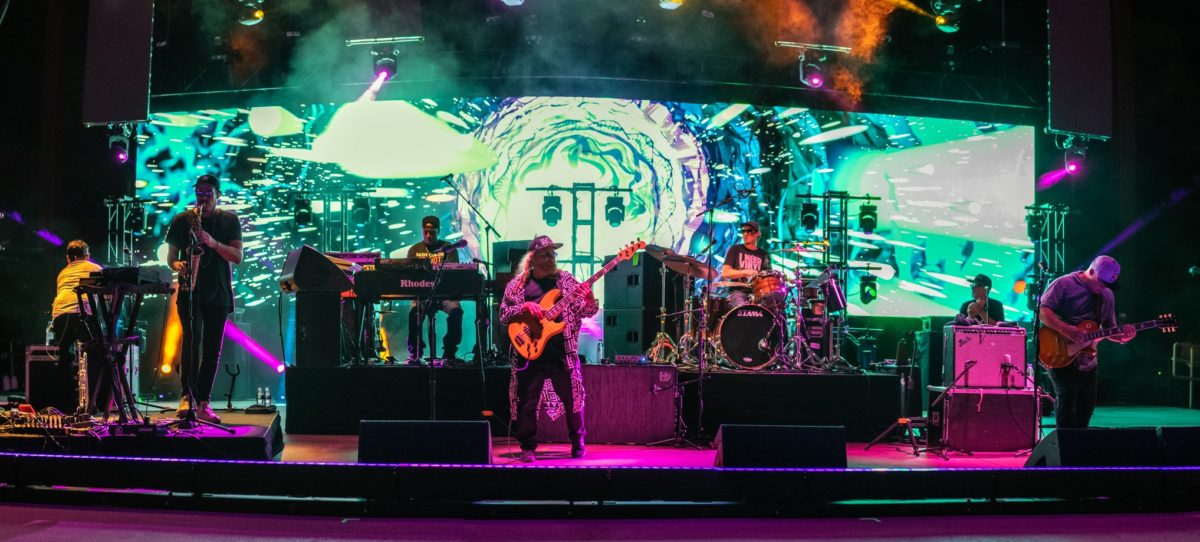
Lettuce is renowned for building the groove and feel through a jam. Do you have any tips about developing a groove in an improv situation?
Yes, and it goes back to exactly what I was talking about. It’s about the synchronicity of life. It’s like a machine. Each person picks a simple part and sticks with it. Even with two people, one person can start with the simplest pattern you can. [beats quarter notes on chest] Then someone plays something around that, but in order to play around that, the first person has to keep playing it. Even though you want to be the next person to play over it, you can’t because you have to keep your part going.
Get your part, make it simple, and continuously play it while other people add their part. Then feel that. Metaphorically, you’re building something like a house. You need to start with a foundation. There’s a lot of simple parts that make up the beauty of music. When you look at the whole woven fabric, it’s hard to see that. It’s like, “Oh gosh, how could I ever make this fabric?” But if you look at each string, it makes sense. When you start to listen to each instrument and figure out what they are doing, then you can separate the parts to see how they fit and then put them back together.
When you’re making instrumental music, do you have a concept of what you’re writing about?
I think it’s more abstract than that when you’re creating. You’re just feeling how the vibrations go together. You know how you can feel if a song is happier or more melancholy? It’s kind of like that. It’s less specific when it’s starting.
A guitarist in one of the world’s biggest Grateful Dead cover bands told me he attaches the thoughts of love, prosperity, and everyone else’s joy into [his music]. He’s trying to physically and energetically add that thought to the frequency of his guitar when he’s playing it. Ever since I had that talk with him five years ago, I’ve been doing that, too. When I look out at the audience, I think “I wish you well” and I try to attach that to the frequency I’m putting out.
Thoughts are things, so whatever thoughts an individual is having while creating art are energetically [added]. I think in the future we’ll understand more scientifically how that happens and what it is. I’m sure there’s a study on it already. If I’m having bummer thoughts up there, that’s not a good thing. I shouldn’t be doing that. I mean, there’s no shouldn’t’ sometimes that’s good, too. If someone is having a really upset time, you should go see a musician. Bob Dylan was like, “Society is not crushing it right now and I’m not feeling it.” A lot of people agreed and felt that way, too.
You’ve done a lot of hip hop work, but I was wondering what it was like working with Dr. Dre. What takeaway did you get from it?
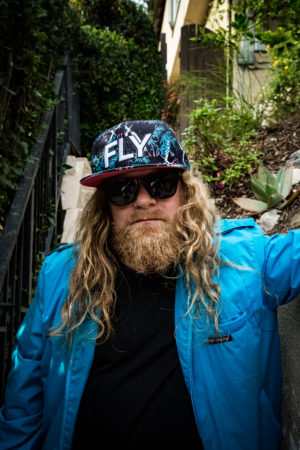 It was majorly character building. I was working with him for the good part of a year while we were making a lot of records. The first night we ever worked together, we did a really cool record with Eminem, Fifty Cent, and Dr. Dre rapping on it. It was really dope.
It was majorly character building. I was working with him for the good part of a year while we were making a lot of records. The first night we ever worked together, we did a really cool record with Eminem, Fifty Cent, and Dr. Dre rapping on it. It was really dope.
It was just really encouraging and uplifting. There’s no one like him. He’s a wonderful, one-of-a-kind person that throws amazing energy at everyone in the room. Since I’m such a fan and since I grew up around L.A., I was really familiar with who he was as a person. I was intimidated at first and didn’t know what to expect, but he immediately made me feel comfortable and was really kind. It was way more spiritual than I could have imagined. I had no idea, but I should have because of the power of music and the energy he’s throwing down.
I remember hearing the record later and thinking the bass sounded incredible. I asked him, “What did you do to my bass?” He said, “I just turned it up. I barely even had to EQ it.” I felt like that was a major compliment. To be able to play bass on a Dr. Dre record is [unreal]. When I first picked up the bass, I hoped maybe one day that could happen, so I’m very grateful for that.
Elevate and Resonate came out of the same recording period. How are they related and how are they different?
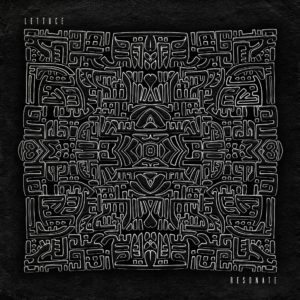 Russell Elevado is our co-producer and engineer on both records, which is a major thing that’s related. When you listen to this [Resonate], it just has so much life. I’m not trying to compare it to the other records, but it’s so warm. The frequencies just feel good on your body. This is like real, actual, natural medicine. Just like how we have great herbs and great tinctures and healing foods, it’s got a real substance to it.
Russell Elevado is our co-producer and engineer on both records, which is a major thing that’s related. When you listen to this [Resonate], it just has so much life. I’m not trying to compare it to the other records, but it’s so warm. The frequencies just feel good on your body. This is like real, actual, natural medicine. Just like how we have great herbs and great tinctures and healing foods, it’s got a real substance to it.
I don’t know how to say they’re different. They’re definitely different because there are different songs on the second one from the first one. [laughs] I think if you listen to them, you might say this one has a lot more hardcore funk in the earlier part of it, but they both get psychedelic. This one might have a little more old school funk compared to Elevate, so any crazy funk-heads might consider that. To me, they’re very similar. To answer the question I’d have to listen to one and then the other because in my mind they’re all blended together.
Living outside of D.C., I was pumped to hear “Checker Wrecker”. Are you a big go-go fan?
Yeah, I love it. My original nickname wasn’t Jesus. When I was a little kid, they called me “Boogie” until I was about 14 or 15. When you hear go-go, you can call it dancing, but that is what you boogie to! That is some boogie shit. It makes you move. I love that beat and that whole culture and where it started from. My brother and I were on tour with Sy Smith and we got to go to D.C. We said, “We’re going to see go-go,” and we weren’t taking no for an answer. So we went through Rock Creek Park and went to this place called The Black Hole. It was super lit. So I’ve definitely experienced go-go, but not a ton. I haven’t been there every night, but I’ve always listened to that stuff. Curtis Blow had a bunch of go-go musicians on his records. I’ve been a huge fan of that sound before I even knew what to call it.
[Tyrone “Jungle Boogie” Williams] is so amazing. He was introduced to us by our friend Derek, and we’ve become such good friends with them. Every time we’re in the area, we rock with them and go out to dinner. It’s a blessing to know those guys. They brought in Big Tony Fisher and he has such beautiful, joyful energy. They’re all kind, kind people. We’re blessed to know them and work with them. I just love people that study that music and the people that invented that music.
Hip hop and go-go are community-building music – that’s the origin of those genres. It takes a village to raise a child and that’s what their original intentions were. That’s why those musics are still blasting so far no matter how many convolutions they get. The initial energy behind them [was so powerful]. I think it’s really important for all businesses and all the things you’re into, to check and figure out what the original energy was when they started that thing. That is going to live on in it. It’s like the song. When you have the heartbeat and initial energy behind a song, if it’s positive it will stay positive. Music is beautiful because it transmutes everything and the frequencies heal all the time. I think the energy of hip hop and go-go is so much about community building and brotherly love and unity.
So it must be safe to say you’re trying to do that with Lettuce, too.
One hundred percent. Things are crazy during this social distancing time, but I think unity and us all coming together is the most important thing for us all. We have to communicate more and maybe that’s what this is about. We have to communicate a little better than we already are, and we don’t even have to talk to do it. This is about feeling. The whole band is about unity and people coming together and focusing on our strengths and appreciating our differences. We have to come together, be productive, and be creative as one species. If you look at it from far away, the Earth is a living being that we are a part of. We’re a natural part of this whole thing and the rest of the planet seems to be working together well, so I think we should get into it. I think we are in a way, and that’s beautiful.

